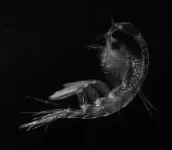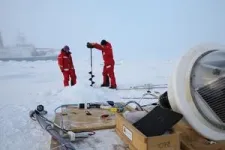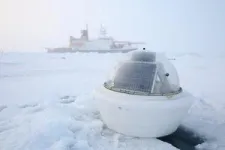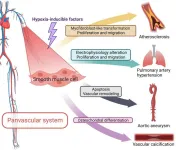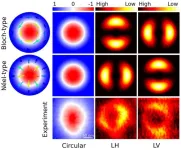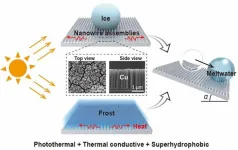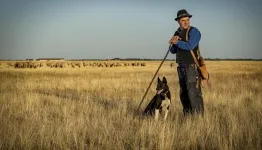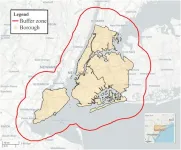(Press-News.org) Due to intensifying sea-ice melting in the Arctic, sunlight is now penetrating deeper and deeper into the ocean. Since marine zooplankton respond to the available light, this is also changing their behaviour – especially how the tiny organisms rise and fall within the water column. As an international team of researchers led by the Alfred Wegener Institute has now shown, in the future this could lead to more frequent food shortages for the zooplankton, and to negative effects for larger species including seals and whales. The study was just released in the journal Nature Climate Change.
In response to anthropogenic climate change, the extent and thickness of the Arctic sea ice are declining; the mean sea-ice extent is currently decreasing at a rate of 13 percent per decade. As early as 2030 – as the latest studies and simulations indicate – the North Pole could see its first ice-free summer. As a result, the physical conditions for organisms in the Arctic Ocean are changing just as visibly. For example, due to less and thinner sea ice, sunlight can penetrate much farther below the surface. As a result, under certain conditions the primary production – i.e., the growth – of microalgae in the water and ice can increase substantially. How these changing light conditions are affecting higher trophic levels in the food chain – like zooplankton, which feed in part on microalgae – remains poorly understood. In this regard, an international team of researchers led by Dr Hauke Flores from the Alfred Wegener Institute, Helmholtz Centre for Polar and Marine Research (AWI) has now gained valuable insights.
According to Flores: “Every day, the largest-scale mass movement of organisms on our planet takes place in the ocean – the daily migration of the zooplankton, which include tiny copepods and krill. At night, the zooplankton rise near the water’s surface to feed. When day comes, they migrate back to the deep, keeping them safe from predators. Although the individual organisms are minuscule, taken together this constitutes a tremendous daily vertical motion of biomass within the water column. But in the polar regions, the migration is different – it’s seasonal; in other words, the zooplankton follow a seasonal cycle. During the months-long brightness of the Polar Day in summer, they remain in the deep; during the months-long darkness of the Polar Night in winter, part of the zooplankton rise and remain in the near-surface water just below the ice.”
Both the daily migration at lower latitudes and the seasonal migration in the polar regions are predominantly dictated by sunlight. The tiny organisms usually prefer twilight conditions. They like to stay below a certain light intensity (critical irradiance), which is usually quite low and lies well into the twilight range. When the intensity of sunlight changes in the course of a day or the seasons, the zooplankton go where they can find their preferred light conditions, which ultimately means they rise or sink in the water column. “Particularly when it comes to the topmost 20 metres of the water column, just below the sea ice, there was no available data on the zooplankton,” Flores explains. “But it’s precisely this hard-to-reach area that’s most interesting, because it’s in and just below the ice where the microalgae that the zooplankton feed on grow.” In order to take readings there, the team designed and built an autonomous biophysical observatory, which they moored below the ice at the end of the MOSAiC expedition with the AWI research icebreaker Polarstern in September 2020. Here – far from any light pollution due to human activities – the system was able to continually measure the light intensity below the ice and the zooplankton’s movements.
“Based on our readings, we identified an extremely low critical irradiance for the zooplankton: 0.00024 watts per square metre,” says the AWI researcher. “We then fed this parameter into our computer models for simulating the sea-ice system. This allowed us to project, for a range of climate scenarios, how the depth of this irradiance level would change by the middle of this century if the sea ice grew thinner and thinner due to climate change.” What the experts found: Due to the steadily declining ice thickness, the critical irradiance level would drop to greater depths earlier and earlier in the year and wouldn’t return to the surface layer until later and later in the year. Since the zooplankton fundamentally remain in waters below this critical level, their movements would mirror this change. Accordingly, in these future scenarios they remain at greater depths longer and longer, while their time near the surface below the ice in winter grows shorter and shorter.
“In warmer future climates, the ice will form later in the autumn, resulting in reduced ice-algae production,” Flores explains. “This, in combination with their delayed rise to the surface, could lead to more frequent food shortages for the zooplankton in winter. At the same time, if the zooplankton rise earlier in the spring, it could endanger the larvae of ecologically important zooplankton species living at deeper levels, more of which could then be eaten by the adults.”
“Altogether, our study points to a previously overlooked mechanism that could further reduce Arctic zooplankton’s chances of survival in the near future,” says Flores. “If that comes to pass, it will have fatal consequences for the entire ecosystem, including seals, whales and polar bears. But our simulations also show that the impact on vertical migration will be much less pronounced if the 1.5-degree target can be reached than if greenhouse-gas emissions rise unchecked. Accordingly, every tenth of a degree of anthropogenic warming that can be avoided is critical for the Arctic ecosystem.”
END
Due to sea-ice retreat, zooplankton could remain in the deep longer
New study shows: Climate change is affecting the seasonal vertical migration of zooplankton in the Arctic
2023-08-28
ELSE PRESS RELEASES FROM THIS DATE:
Hypoxia and panvascular diseases: exploring the role of hypoxia-inducible factors in vascular smooth muscle cells under panvascular pathologies
2023-08-28
This study is led by Prof. Junbo Ge (Department of Cardiology, Zhongshan Hospital, Fudan University, Shanghai Institute of Cardiovascular Diseases), Prof. Hua Li (Department of Cardiology, Zhongshan Hospital, Fudan University, Shanghai Institute of Cardiovascular Diseases), and Prof. Hao Lu (Department of Cardiology, Zhongshan Hospital, Fudan University, Shanghai Institute of Cardiovascular Diseases).
As an emerging concept, panvascular diseases encompass a group of cardiovascular disorders characterized mainly by atherosclerosis, involving crucial organs such as the ...
Spintronics: X-ray microscopy unravels the nature of domain walls
2023-08-28
Magnetic skyrmions are tiny vortices-like of magnetic spin textures that - in principle - can be used for spintronic devices, for example very fast and energy-efficient data storage devices. But at the moment it is still difficult to control and manipulate skyrmions at room temperature. A new study at BESSY II analyses the formation of skyrmions in ferrimagnetic thin films of dysprosium and cobalt in real time and with high spatial resolution. This is an important step towards characterising suitable materials with skyrmions more precisely in the future.
Isolated magnetic skyrmions are topologically protected spin textures that are in the focus of research ...
World first drug to target form of previously untreatable life-threatening ‘bad cholesterol’
2023-08-28
A new drug offers a breakthrough world first treatment for Lipoprotein(a), a largely genetic form of cholesterol that increases the risk of heart attack and stroke, announced today by study lead Professor Stephen Nicholls, Director of the Monash University’s Victorian Heart Institute and Victorian Heart Hospital.
High levels of Lipoprotein(a), known as Lp(a) or spoken as ‘LP little a’, impact one in five people globally with no approved treatment currently on the market.
The trial demonstrated the success of Muvalaplin - the first oral drug ever ...
An all-in-one surface design of copper nanowire assemblies to achieve ~100% defrosting efficiency
2023-08-28
Scientists at Dalian University of Technology propose a design of copper nanowire assemblies that can sufficiently enhance the de-icing and defrosting efficiency without conventional energy input. Specifically, the defrosting efficacy approaches 100%, a record-high value compared to reported studies.
The research, published in International Journal of Extreme Manufacturing, shows a simple electrochemical method for fabricating nanowire assemblies with controlled pattern, hierarchy, and size. This enables the simultaneous presentation of photothermal, thermal conductive, and superhydrophobic ...
Social justice for traditional knowledge holders will help conserve Europe’s nature
2023-08-28
It is well known that biodiversity of cultural landscapes is threatened by land abandonment and agricultural intensification. Traditional, low chemical and machinery input management systems have long been acknowledged for their diverse benefits to maintain and enhance biodiversity, however, the recognition of traditional knowledge, on which these traditional management practices are based, started only relatively recently. The recognition of traditional knowledge holders themselves is an even more recent phenomenon. A recently published paper aims to ...
Trial re-evaluates routine defibrillator implantation after myocardial infarction
2023-08-28
Amsterdam, Netherlands – 26 Aug 2023: Is the routine implantation of an implantable cardioverter defibrillator (ICD) in myocardial infarction survivors with heart failure still an adequate therapy for prevention of sudden cardiac death? The PROFID EHRA trial is set to answer this question in a large, multicentre, EU-funded study set to enrol the first patient this summer. The consortium of partners and colleagues involved in the trial, including the European Heart Rhythm Association (EHRA) of the European Society of Cardiology (ESC), will meet during ESC Congress 2023 to discuss the start of the study.
Myocardial ...
Price tag on cardiovascular disease in Europe higher than entire EU budget
2023-08-28
Amsterdam, Netherlands – 26 Aug 2023: Cardiovascular disease (CVD) cost the EU an estimated €282 billion in 2021, according to late breaking research presented at ESC Congress 2023.1 Health and long-term care accounted for €155 billion (55%) of these costs, equalling 11% of EU health expenditure. The analysis was a collaborative effort by the European Society of Cardiology (ESC) and the University of Oxford, UK.
Study author Dr. Ramon Luengo-Fernandez of the University of Oxford said: “CVD had a significant impact ...
NIH-funded study supports use of ECMO for critically ill patients with obesity
2023-08-28
NIH-funded study supports use of ECMO for critically ill patients with obesity
ECMO does not appear to complicate treatment for severe respiratory failure for adults with obesity
A National Institutes of Health-supported study suggests that adults with obesity may benefit from the use of extracorporeal membrane oxygenation (ECMO), an advanced form of breathing support, when in intensive care for respiratory failure. ECMO’s use was previously questioned for patients with obesity due to the belief that it may complicate ...
Muvalaplin, an oral small molecule inhibitor of lipoprotein(a) formation
2023-08-28
About The Study: Muvalaplin was not associated with tolerability concerns and lowered lipoprotein(a) (Lp[a]) levels up to 65% following daily administration for 14 days in this first-in-human phase 1 study involving healthy participants. Lipoprotein(a) is associated with atherosclerotic disease and aortic stenosis. Longer and larger trials will be required to further evaluate safety, tolerability, and effect of muvalaplin on Lp(a) levels and cardiovascular outcomes.
Authors: Stephen J. Nicholls, M.B.B.S., Ph.D., of Monash University in Clayton, ...
Stevens researchers take aim at weather forecasters’ biggest blindspot
2023-08-28
Anyone who’s been caught in an unexpected downpour knows that weather forecasting is an imperfect science. Now, researchers at Stevens Institute of Technology are taking aim at one of meteorologists’ biggest blind spots: extremely short-term forecasts, or nowcasts, that predict what will happen in a given location over the next few minutes.
“This isn’t just about whether you should take your umbrella with you when you go on a walk,” said Temimi. “The forecasts that we’re missing – the ones that look ...
LAST 30 PRESS RELEASES:
Sleep loss linked to higher atrial fibrillation risk in working-age adults
Visible light-driven deracemization of α-aryl ketones synergistically catalyzed by thiophenols and chiral phosphoric acid
Most AI bots lack basic safety disclosures, study finds
How competitive gaming on discord fosters social connections
CU Anschutz School of Medicine receives best ranking in NIH funding in 20 years
Mayo Clinic opens patient information office in Cayman Islands
Phonon lasers unlock ultrabroadband acoustic frequency combs
Babies with an increased likelihood of autism may struggle to settle into deep, restorative sleep, according to a new study from the University of East Anglia.
National Reactor Innovation Center opens Molten Salt Thermophysical Examination Capability at INL
International Progressive MS Alliance awards €6.9 million to three studies researching therapies to address common symptoms of progressive MS
Can your soil’s color predict its health?
Biochar nanomaterials could transform medicine, energy, and climate solutions
Turning waste into power: scientists convert discarded phone batteries and industrial lignin into high-performance sodium battery materials
PhD student maps mysterious upper atmosphere of Uranus for the first time
Idaho National Laboratory to accelerate nuclear energy deployment with NVIDIA AI through the Genesis Mission
Blood test could help guide treatment decisions in germ cell tumors
New ‘scimitar-crested’ Spinosaurus species discovered in the central Sahara
“Cyborg” pancreatic organoids can monitor the maturation of islet cells
Technique to extract concepts from AI models can help steer and monitor model outputs
Study clarifies the cancer genome in domestic cats
Crested Spinosaurus fossil was aquatic, but lived 1,000 kilometers from the Tethys Sea
MULTI-evolve: Rapid evolution of complex multi-mutant proteins
A new method to steer AI output uncovers vulnerabilities and potential improvements
Why some objects in space look like snowmen
Flickering glacial climate may have shaped early human evolution
First AHA/ACC acute pulmonary embolism guideline: prompt diagnosis and treatment are key
Could “cyborg” transplants replace pancreatic tissue damaged by diabetes?
Hearing a molecule’s solo performance
Justice after trauma? Race, red tape keep sexual assault victims from compensation
Columbia researchers awarded ARPA-H funding to speed diagnosis of lymphatic disorders
[Press-News.org] Due to sea-ice retreat, zooplankton could remain in the deep longerNew study shows: Climate change is affecting the seasonal vertical migration of zooplankton in the Arctic
